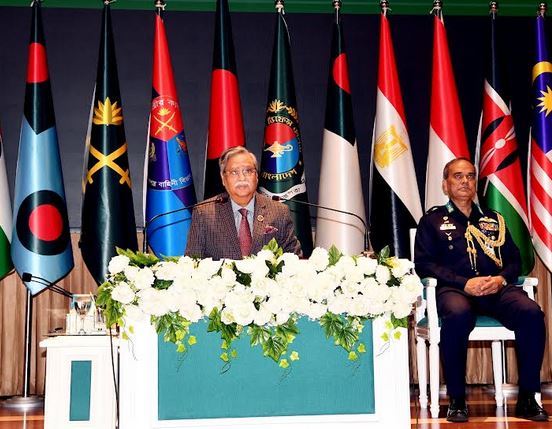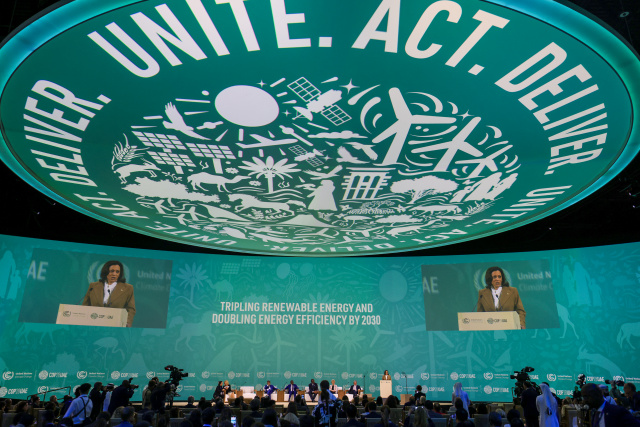AFP, DUBAI: Nearly 120 nations pledged to triple the
world’s renewable energy within seven years at UN climate talks Saturday as the
United States pushed to crank up nuclear capacity and slash methane emissions.
With smoggy skies in Dubai highlighting the challenges facing the world,
leaders at the COP28 conference threw their support behind voluntary pledges
aimed at ramping up alternatives to fossil fuels.
A massive deployment of solar, wind, hydroelectric and other renewables is
crucial to efforts to replace planet-heating coal, oil and gas and achieve
net-zero carbon emissions by 2050.
– Fossil fuel fight –
But COP28 negotiators face far tougher talks on the fate of fossil fuels
over the next two weeks.
“Everyone stuck to their traditional positions,” said one who spoke on
condition of anonymity.
But on clean energy, more than half of all nations signed up to a
commitment to triple global renewable capacity and double energy efficiency by
2030, the COP28’s Emirati president said.
However, major oil producers including Saudi Arabia, Russia and Iran did
not join, nor is top consumer China on the list.
“I do need more, and I’m kindly requesting all parties to come on board as
soon as possible please,” COP28 president Sultan Al Jaber told delegates.
Clean power advocates welcomed the commitment but said it must be
accompanied by the phaseout of dirtier forms of energy.
“The future will be powered by solar and wind, but it won’t happen fast
enough unless governments regulate fossil fuels out of the way,” said Kaisa
Kosonen, the head of Greenpeace’s COP28 delegation.
Jaber also announced a pledge by oil and gas companies responsible for 40
percent of global production — including Saudi giant Aramco and the UAE firm
ADNOC he heads — to decarbonise their operations by 2050 and curb methane
emissions.
But the pledges do not include the pollution when the fuels are burned by
their customers, and were criticised for repackaging previous, non-binding
commitments.
“This charter is proof that voluntary commitments from the oil and gas
industry will never foster the level of ambition necessary to tackle the
climate crisis,” said Melanie Robinson of the World Resources Institute, a
nonprofit research body.
– ‘Destructive’ methane –
It comes after the US Environmental Protection Agency said it would tighten
curbs on methane emissions from its oil and gas industry.
The new standards will phase in the elimination of routine flaring of
natural gas produced by oil wells, and require comprehensive monitoring of
methane leaks from wells and compression stations.
Methane is responsible for about one-third of the warming from greenhouse
gases, second only to CO2.
“It is fugitive gas, and it just is out there doing damage,” said US
climate envoy John Kerry, who met his Chinese counterpart Xie Zhenhua in Dubai
Saturday to discuss how to curb the gas.
Their meeting followed an agreement with the US earlier this month where
China for the first time agreed to include all greenhouse gases in its next
national climate pledge for 2035.
Kerry also announced that Turkmenistan — which leaks more methane per unit
of oil and gas than any other country — had signed up to an existing pledge to
curb these harmful emissions.
The energy sector is the second-largest source of human-caused methane
emissions.
Agriculture is the first, accounting for a quarter of methane emissions,
mostly from livestock.
The US also joined a coalition of dozens of nations committed to phasing
out coal power plants whose emissions cannot be captured.
– Nuclear option –
While COP28 rallied behind renewables, Washington led a call by more than
20 nations to triple nuclear energy capacity by 2050.
In a declaration, countries ranging from Britain to Ghana, Japan and
several European nations said nuclear power had a “key role” in achieving
carbon neutrality by mid-century.
But its use as a cleaner alternative to fossil fuels is highly
controversial, with many environmental groups warning about safety risks and
the disposal of nuclear waste.
Yet Kerry insisted “you can’t get to net zero 2050 without some nuclear”.
Environmental group 350.org said the 2011 Fukushima nuclear disaster in
Japan highlighted the dangers.
“We don’t have time to waste on dangerous distractions like nuclear
energy,” said its North America director Jeff Ordower.
More than 50 world leaders took the stage at COP28 for the second day in a
row, with US Vice President Kamala Harris announcing a $3 billion contribution
to a fund to help developing countries with energy transition and the effects
of climate change — Washington’s first pledge to it since 2014.








